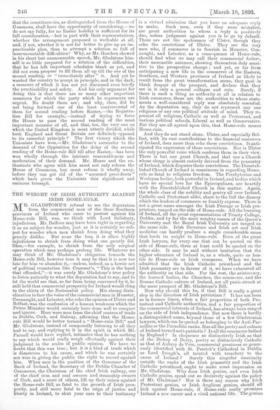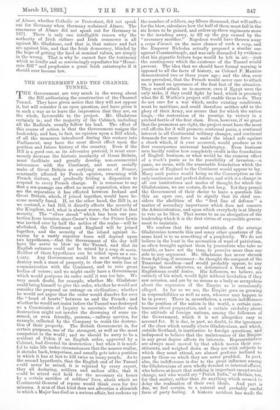THE WEIGHT OF IRISH AUTHORITY AGAINST IRISH HOME-RULE.
MR. GLADSTONE'S refusal to see the deputation from the commercial men. of the three Southern provinces of Ireland who came to protest against his Home-rule Bill, was, we think with Lord Salisbury, injudicious. Mr. Balfour may have been right in regarding it as no subject for wonder, just as it is certainly no sub- ject for wonder when men shrink from doing what they greatly dislike. But none the less, it is often highly injudicious to shrink from doing what one greatly dis- likes,—for example, to shrink from the only surgical operation which may perhaps prolong life. Whatever we may think of Mr. Gladstone's obligation towards the Home-rule Bill, however true it may be that it is now too late for him to abandon it,—unless, indeed, as a heroic act of political recantation like Cranmer's, "This is the hand that offended,"—it was surely Mr. Gladstone's true policy to listen patiently to what the deputation had to say, and to let the world see that, so far from being convinced by it, he still held that commercial prosperity for Ireland would cling to the skirts of the Nationalist policy. His strong disin- clination to face the voice of the commercial men in Munster, Connaught, and Leinster, who echo the opinion of Ulster and Belfast, was the confession of a human weakness which the Prime Minister would certainly have done well to conquer and ignore. Here were men from the chief centres of trade in Dublin, Cork, and Galway, affirming that the Home- rule Bill would be better termed a "Home-ruin Bill," and Mr. Gladstone, instead of composedly listening to all they had to say, and replying to it in the spirit in which Mr. Parnell would have replied, intimates that he has nothing to say which would really weigh effectually against their judgment in the scales of public opinion. We have no doubt that this was true ; but it is a kind of truth which is disastrous to his cause, and which he was certainly not wise in giving the public the right to record against him. When men in the position of the Governor of the Bank of Ireland, the Secretary of the Dublin Chamber of Commerce, the Chairman of the chief Irish railway, one of the chief iron and coal owners and steamship owners of Cork, and a score of others, lift up their voices against the Home-rule Bill, as fatal to the growth of Irish pros- perity, and still more fatal to the reign of justice and liberty in Ireland, to shut your ears to their testimony is a virtual admission that you have no adequate reply to make. Such men, even if they were mistaken, are great authorities to whom a reply is positively due, unless judgment against you is to go by default. These are not the spokesmen of Ulster, though they echo the convictions of Ulster. They are the very men who, if commerce is to flourish in Munster, Con- naught, and Leinster, as a consequence of Home-rule, should find what we may call their commercial feelers, their mercantile antennsa, showing themselves duly sensi- tive to the prospective change ; and yet, so far from anticipating a new life in the commerce of the Eastern, Southern, and Western provinces of Ireland as likely to result from the great transformation scene, they gaze in blank despair at the prospect, and declare that they see in it only a general collapse and ruin. Surely, if there is such a thing as authority at all in relation to Irish commerce, these are the authorities to whose state- ments a well-considered reply was absolutely essential. As the deputation say, they do not represent any one religious or any one political attitude of mind. They re- present all religions Catholic as well as Protestant, and various political schools, Liberal as well as Conservative. But they are all agreed upon this, that Home-rule means Home-ruin.
And they do not stand alone. Ulster, and especially Bel- fast, with its vast contributions to the financial resources of Ireland, does more than echo these convictions. It anti- cipated the expression of these convictions. Nor is Ulster the only powerful voice which confirms them in their view. There is but one great Church, and that one a Church whose clergy is almost entirely derived from the peasantry of Ireland, which disputes those- convictions. The Disestab- lished Church of Ireland is unanimous in regarding Home- rule as fatal to religious freedom. The Presbyterian and Wesleyan bodies, both powerful in Ireland, and bodies which have no special love for the Episcopalians, are heartily with the Disestablished Church in this matter. Again, the whole class of the nobility and gentry all over Ireland, Catholic and Protestant alike, share to the full the dismay which the leaders of commerce so frankly express. There is not a great name amongst the Irish Peerage or Irish pro- prietors, ranged on the side of Home-rule. All the learning of Ireland, all the great representatives of Trinity College, Dublin, and by far the most weighty names of the Queen's University and the Royal Irish University are ranged on the same side. Irish literature and Irish art and Irish medicine can hardly produce a single considerable name that lends its weight to Home-rule. Even of the great Irish lawyers, for every one that can be quoted on the side of Home-rule, three at least could be quoted on the other side. It may be said without hesitation that the higher education of Ireland is, as a whole, quite as hos- tile to Home-rule as Irish commerce. When we have admitted that the Irish Catholic priesthood and the Irish peasantry are in favour of it, we have exhausted all the authority on that side. For the rest, the aristocracy, the learned bodies, the Churches, the commerce, and the Roman Catholic culture of Ireland, are all panic-struck at the mere prospect of Mr. Gladstone's Bill.
Now why should this be, if that Bill is really a great stop in the direction of Irish patriotism ? It has not been so in former times, when a fair proportion of both Pro- testant and Catholic authorities, and a fair proportion of the commercial interests of Ireland, has always been ranged on the side of Irish independence. But now there is hardly a distinguished name, beyond those of a few Glad stonian lawyers, which can be quoted as belonging to the Anti-Par- nellite or the Parnellite ranks. Has all the poetry and culture of Ireland turned anti-patriotic ? Is all the commerce bribed by England Is eloquence so distinctively Irish as that of the Bishop of Derry, poetry so distinctively Catholic as that of Aubrey de Vere, commercial greatness so gener- ously identified with St. Patrick's Cathedral in Dublin as Lord Iveagh's, all tainted with treachery to the cause of Ireland ? Surely this singular unanimity outside the ranks of the Irish peasantry and the Irish Catholic priesthood, ought to make some impression on Mr. Gladstone. Why does Irish genius, and even Irish Catholic genius, speak out so decisively against the policy of Mr. Gladstone ? Nor is there any reason why Irish Protestant genius, or Irish Anglican genius, should all kick against Home-rule, if Home-rule really promises Ireland a new career and a vivid national life. The genius of Alsace, whether Catholic or Protestant, did not speak out for Germany when Germany reclaimed Alsace. The commerce of Alsace did not speak out for Germany in 1871. There is only one intelligible reason why the authority of Irish culture and Irish commerce is all against Mr. Gladstone, and that is, that nature and fact are against him, and that the Irish democracy, blinded by the hope of getting the laud at nominal values, are simply in the wrong. That is why he cannot face the testimony which so loudly and so convincingly repudiates his "Home- r= Bill" and prophesies a great Irish catastrophe if it should ever become law.



































 Previous page
Previous page